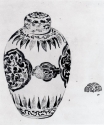Home > Catalogue > Browse > The Blue Girl: Portrait of Miss Elinor Leyland << >>
Composition
According to the Pennells the portrait of Elinor Leyland as commissioned by F. R. Leyland was to be a large full length. 1
Whistler described it as 'my picture of little Miss Leyland in blue cashmere and velvet - in short, the arrangement in blue.' 2 The Pennells write that in this painting Whistler 'wished to paint blue on blue as he had painted white on white.' 3 The colour scheme, according to Thomas Robert Way (1861-1913), was inspired by the famous Blue Boy of Thomas Gainsborough (1727-1788), which is now in the Huntington Library, San Marino, CA. 4
Elinor's pose, on the other hand, has been likened to that of Pablo de Valladolid by Diego Rodriguez de Silva y Velázquez (1599-1660), of which Whistler owned a photograph. 5
The composition is known from an elaborate pastel in the Freer Gallery of Art, r.: The Blue Girl; v.: Curtain [M.0521]. The background is blue, her hat and short dress are in two shades of blue. The little girl, with short red hair parted in the middle, hands on her waist and legs slightly apart, stands facing the spectator.
There are several studies of Elinor in this position, showing her full face, including Elinor Leyland seated with a dog [M.0515], Studies of Baby Leyland [M.0516] (reproduced above), Study for a portrait of Baby Leyland [M.0517], Elinor Leyland [M.0518], Study for 'The Blue Girl: Portrait of Miss Elinor Leyland' [M.0519], and Study for 'The Blue Girl: Portrait of Miss Elinor Leyland' [M.0520]. The drypoint Elinor Leyland [137] shows a very similar composition, and dates from about 1873.
A pen drawing of the portrait, Study for 'The Blue Girl: Portrait of Miss Elinor Leyland' [M.0717], was signed with a butterfly by Whistler that can be dated about 1879, and was labelled 'Miss Eleanor Leyland. "Babs" ' by Charles Augustus Howell (1840?-1890).
Whistler returned to the colour scheme about 1879 with a similar composition (The Blue Girl: Portrait of Connie Gilchrist [YMSM 207]) which may account for a story told by Mortimer Luddington Menpes (1860-1938) about the 'Blue Girl': 'The father of a family of three or four girls told me that each maiden in her turn, as she reached the desired age, had sat to Whistler for the same picture – until at last even the youngest had grown too old, and the picture was finished with a damsel from another family altogether.' 6
The blue and white porcelain could have come from Whistler's own collection, which was sold at the time of his bankruptcy in 1879, or from the collection of F. R. Leyland. Between 1876 and 1878 Whistler had made numerous pen, ink, and wash studies of porcelain for the catalogue of Sir Henry Thompson's collection. 7 Whistler's expressive brushwork conveyed the essence of the designs on the porcelain, and indeed some studies for the final illustrations – including Oviform Pot and cover [M.0646] and Oviform Pot and cover [M.0647], reproduced above – are comparable to the pieces painted on Elinor Leyland's portrait.
Technique
The remaining fragments are painted with fairly full round soft brushstrokes and creamy textured paint.
Conservation History
It was among the 'Bundles of rubbish [which] were carried off for a few shillings' at the White House after Whistler's bankruptcy in 1879 'in such a deplorable condition that nothing now remains but the two pots of flowers which stood on either side of the figure.' 8
According to an inscription in C. A. Howell's hand on the back of Study for 'The Blue Girl: Portrait of Miss Elinor Leyland' [M.0717], the oil was 'destroyed by Whistler in the early part of 1879.' It was probably one of the 'unfinished portraits of two of [Leyland's] daughters' painted 'in a very high key' and 'more or less destroyed' by Whistler at the time of the bankruptcy in 1879, according to Thomas Robert Way (1861-1913). Way said that Whistler 'destroyed [it] leaving only the lower half of the canvas with two blue and white pots of flowers, which formed part of the background. These were preserved in the form of two panels.' 9
In October 1907 C. L. Freer of Detroit bought from T. R. Way 'A Chinese Vase filled with yellow flowers' cut from the right-hand side, and 'A Chinese vase, filled with flowers and a large dish' cut from the left-hand side of the full-length oil. 10 The fragments were relined and resurfaced in 1925, cleaned and surfaced in 1951, according to Freer Gallery conservation files. David Curry remarked in 1984 that they were 'somewhat dark and murky.' 11
Frame
Flat Whistler, with missing outer frame, possibly dating from 1879. 12
Notes:
1: Pennell 1908 [more], vol. 1, pp. 175-76; Pennell 1921C [more], p. 134.
2: Whistler to W. Greaves, [1871/1876], GUW #11494.
3: Pennell 1908 [more], vol. 1, p. 175.
5: Curry 1984 [more], p. 250, plate 228.1.
6: Menpes 1904 A [more], p. 75.
8: Pennell 1908 [more], vol. 1, p. 258.
10: Labels on back of canvas signed by T. R. Way.
11: Curry 1984 [more], p. 250.
12: Dr Sarah L. Parkerson Day, Report on frames, 2017; see also Parkerson 2007 [more].
Last updated: 25th November 2020 by Margaret
















